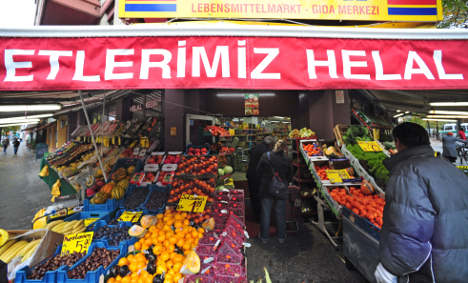- Arsonists attack Turkish community centres and businesses across Germany
- German police disperse Kurdish protest against Turkish offensive
- Turkish and Kurdish groups accuse each other of importing foreign conflict into Germany
KURDS
‘Sitting on a powderkeg’: Tension between Germany’s Turks and Kurds
Syrian Kurd Mohamed Zidik, 76, still buys his bread and baclavas from his Turkish neighbours in Berlin, but he knows better than to expound on his views about Ankara's offensive in his hometown.
Published: 19 October 2019 16:32 CEST

Participants in a demonstration by Kurds against the Turkish military offensive in northern Syria have posters with a photo of Havrin Khalaf, a Kurdish politician killed in Syria. Photo: Fabian Strau
Since Turkish forces launched their assault on Kurds in northeastern Syria, tensions have risen in Germany where millions of Turks and Kurds live side by side.
Shops have been trashed, knife attacks reported and insults traded, prompting Germany's integration commissioner Annette Widmann-Mauz to call for restraint.
“We have a responsibility to prevent the conflict in the region from becoming a conflict in our society,” she said in an interview with the Funke newspaper group.
Of the roughly three million people with Turkish nationality or roots living in Germany, around one million are Kurds.
“We are sitting on a powderkeg in Germany,” Turkish expert Burak Copur told ZDF broadcaster.
“The emotions here cannot be viewed in isolation from the political developments in Turkey, which are mirrored in Germany.”
Some 15,000 pro-Kurdish demonstrators are set to take to the streets in Cologne on Saturday, with similar demos planned in other European cities.
German police are on high alert to ward off any new violence from protests over the Turkish offensive after clashes erupted on the sidelines of a demonstration on Monday in the western city of Herne.
Turks performed the “wolf salute” hand gesture linked to the country's nationalist far right as a Kurdish protest passed.
It was one provocation too far for some marchers, and a fight erupted leaving five injured.
In Germany, the hand sign mimicking a wolf's head remains legal, but in neighbouring Austria it has been banned — just like the Nazi-era Hitler salute.
READ ALSO:
'Daily consequences'
In a small cafe in the German capital, Mohamad Khalil, 23, is keeping an eye on a slew of charging walkie-talkies which will be distributed to fellow demonstration organisers to keep order during planned marches this weekend.
“For now, all we have left is protest,” the student acknowledges bitterly, underlining the helplessness he feels over the lot of fellow Kurds.
Germany's Kurds fear that Ankara's offensive could pulverise the foundations they have built in Rojava, the self-proclaimed Kurdish zone in northeast Syria.
Ankara for its part says the main Kurdish militia in Syria is a “terrorist” group with links to its own outlawed Kurdistan Workers' Party (PKK), which has been waging an insurgency in Turkey for three decades.
Melahat Yavas, who works at a Berlin driving school, whole-heartedly backs the Turkish offensive.
“We are sending our soldiers to their deaths to free Syrian children and families, and be it against the terrorists of PKK or IS, Erdogan is a man of his word and he won't leave until our Syrian Muslim brothers are secure within their borders,” Yavas told AFP.
“Turks and Kurds, we live, work and sometimes we laugh together there or here in Germany. My colleague is Kurdish and that's fine. But the PKK is something else,” she added.
In a similar show of backing for the military action, at least five German regional football teams face disciplinary action after their players imitated the military salute performed by the Turkish national team during matches earlier this month.
Such gestures lead to “daily consequences for Kurds, in the streets, when they are protesting, in their work places and definitely in the schools where they are victims of discrimination by Turkish children,” charged Rohat Geran of a Kurdish umbrella federation.
Kurds in Germany have also accused DITIB mosques in the country of pushing Ankara's views on the sidelines of prayers.
But the powerful Turkish religious organisation rejected the charges, telling AFP that it has never championed such messages.
Some caught in between are just hoping that latest conflict will soon blow over.
“I only go back (to Turkey) once a year… we live well here. So let them sit down at the same table and find a solution, and let us live peacefully in Germany,” pleaded Cezal Vedat, 43, who runs a travel agency specialising in holidays to Turkey.
Url copied to clipboard!


 Please whitelist us to continue reading.
Please whitelist us to continue reading.
Member comments